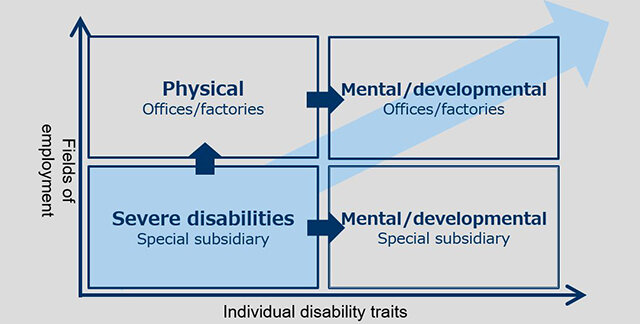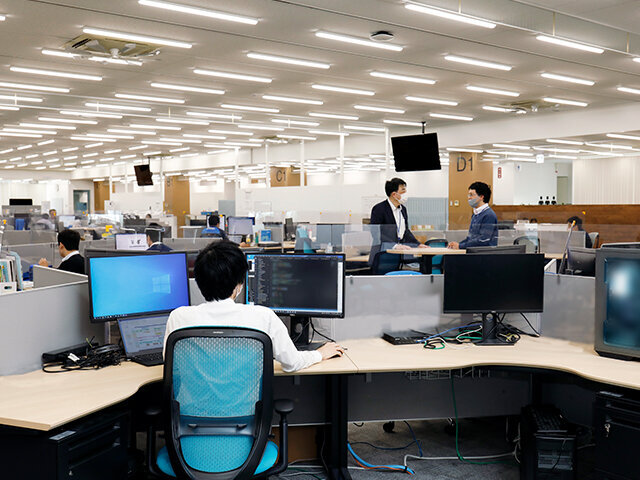We are Shaping the Future! Showcasing Success Stories as We Innovate for a Sustainable Tomorrow
![For the Empowerment of Neurodivergent Persons throughout Society [Part 2]](/global/en/edge-link/uploads/1421_main.png)
Can Employment of Persons with Developmental Disability Really Change Work Style and Organization?
In 2021, the OMRON Group launched a project to recruit human resources with unusual talent. This progressive initiative is all about providing job seekers who, due to their developmental disability, may not be very adept at communication, with employment opportunities in order to give a chance to their outstanding gifts in artificial intelligence (AI) technology, machine learning, or other cutting-edge fields. You'll find it all in the following story, as reported by Yuko Hasegawa, an up-and-coming freelance journalist.
ŃĆĆ
Back in 1972, OMRON Taiyo Co., LTD. the first welfare factory in Japan for persons with physical disabilities, was established when Kazuma Tateishi, the founder of OMRON, and Dr. Yutaka Nakamura, the founder of the Social Welfare Organization Japan Sun Industries(Taiyonoie), resonated with each other's principles. Ever since, the OMRON Group has pioneered the employment of persons with disabilities. More than half a century later, circumstances surrounding the employment of such persons have changed dramatically in Japanese society. It is no longer rare for companies to offer positions to persons with disabilities. Meanwhile, another social issue of persons with specific individual disability traits, such as mental disabilities and developmental disabilities, struggling to land a job, has been brought to the fore.
In 2021, the OMRON Group launched the project to recruit human resources with unusual talent, who are gifted in STEM, to provide them with opportunities to give full play to their aptitude for new product development and research work.
Out in the global job market, it is becoming common practice to respect differences in how brains and nerves work, including those of persons with developmental disabilities, not as relative merits but as diversity, and perceive them in the context of the social model of disability. This framework for understanding the diversity of human brains and nerves is called neurodiversity. Now, the "social model of disability" is the idea that "disabilities" are created by interactions between disabilities of mental and physical functions of individuals and systemic barriers in society, and it is the responsibility of society to remove such barriers. OMRON's project to recruit human resources with unusual talent is perfectly aligned with the concept of neurodiversity.
ŃĆĆ
OMRON embraces the Principles of contributing to a better society by solving social issues through its business. One of the agenda items when they drew up a long-term vision for the employment of persons with disabilities in 2017 was how they should go about recruiting such persons without relying too much on the special subsidiary. Accordingly, they began hiring more persons with disabilities for an even broader range of job categories, including salespersons and staff members, while at the same time addressing the aforementioned social challenge by accelerating the employment of persons with mental and developmental disabilities. One of the solutions to both of these issues is scouting human resources with unusual talent. To hire such talent, they decided to "put minimal weight on interviews but maximal weight on how they dealt with technically challenging problems during internships" on a trial basis.

During the three-week-long internship program offered by the Technology Development Division HQ, Industrial Automation Company, one of OMRON's mainstay businesses, interns were asked to work on a problem of "analyzing human movements from a video and imaging the movements in a virtual space." A candidate who was attending an employment transition support center for persons with developmental disabilities participated in the program. He majored in advanced information studies and possessed top-tier programming skills that put him among the best for graduate students. However, he struggled to pitch his virtues during interviews and so could not secure a position at any company upon graduation from university.
The level of engineering that the candidate incorporated in his answer was such that the team manager was profoundly surprised and filled with joyful expectations, though he hardly spoke at job interviews. Some in the company were naturally concerned that his lack of communication skills may prevent him from mingling with his peers, but at the end of the day, the company opted for change. "The internship was a catalyst for change in our corporate culture and management. Taking his recruitment as an opportunity, I was determined to make ours an inclusive organization, which I hope will go viral," recalled the team manager.
In April 2022, OMRON extended a warm welcome to the intern-turned-employee.
Let us hear what the person in charge of diversity & inclusion at the HR Department has to say about how he is doing in his office: "In the team, he is constantly trying to improve his communication skills. To give you an example, he is making periodical visits for interviews with his supervisor, industrial doctor, counselor who gives guidance on working life at the office he is assigned to, and HR personnel. We also asked him to be a member of Kaien, an employment transition support center for persons with developmental disabilities, thus creating a system for supporting his living, such as going to the hospital, and, if we sense a sign of some change beforehand, sharing it within the team."
His hyperacusis makes him sensitive to noise surrounding him. To isolate himself from the noise and focus, he uses earphones. He also finds conversations challenging. He once confessed, "Sometimes I get brain fog, but I don't know why it happens." Or he took several minutes before he could answer a question from the manager. But now, everyone has become used to this and takes such things for granted. He may not be good at answering "analog" questions, per se, but he is in his element having technical conversations with his engineering peers. He is quick-witted and gets his work done far more quickly than anticipated, and at very high quality. He may need time to verbalize his ideas, but he attends every weekly meeting and presents his work using materials he prepares. Besides, he is working hard to communicate better with people around him, trying to reach out to make friends with others, and thinking of ways to try something new.
 At Work in his Office
At Work in his OfficeNavigating the project to recruit human resources with unusual talent was not without its difficulties. Yet, it was possible to push past these challenges because the upside eclipsed the downside; that is, they are sure to outperform your expectations that, if you give them due consideration according to their disability traits, they reward you with an advanced level of technical capabilities in their area of expertise. Another benefit is that their presence facilitates a review of the way their team is managed or a greater ease of working for the entire workplace. In its long-term vision, "Shaping the Future 2030 (SF2030)," the OMRON Group declares its human resources strategy, which reads, "Inspired by the corporate philosophy of 'contributing to a better society,' the company and its employees will always choose each other and continue growing together." Accordingly, they are implementing human resources measures on a global basis to attract diverse talents and allow each individual to fully live up to their potential by accelerating diversity & inclusion. The project is one of the human resources strategies linked to the long-term vision and, as such, embodies human capital management.
ŃĆĆ